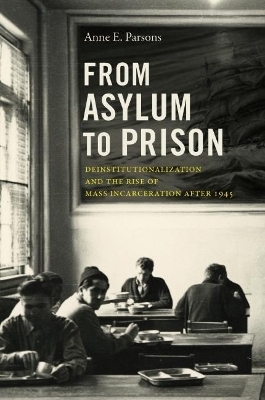
From Asylum to Prison
Deinstitutionalization and the Rise of Mass Incarceration after 1945
Seiten
2022
The University of North Carolina Press (Verlag)
978-1-4696-6947-2 (ISBN)
The University of North Carolina Press (Verlag)
978-1-4696-6947-2 (ISBN)
Recasts the political narrative of the late twentieth century, as Anne Parsons charts how the politics of mass incarceration shaped the deinstitutionalization of psychiatric hospitals and mental health policy making. In doing so, she offers insight into how the prison took the place of the asylum, shaping the rise of the prison industrial complex.
To many, asylums are a relic of a bygone era. State governments took steps between 1950 and 1990 to minimize the involuntary confinement of people in psychiatric hospitals, and many mental health facilities closed down. Yet, as Anne Parsons reveals, the asylum did not die during deinstitutionalization. Instead, it returned in the modern prison industrial complex as the government shifted to a more punitive, institutional approach to social deviance. Focusing on Pennsylvania, the state that ran one of the largest mental health systems in the country, Parsons tracks how the lack of community-based services, a fear-based politics around mental illness, and the economics of institutions meant that closing mental hospitals fed a cycle of incarceration that became an epidemic.
This groundbreaking book recasts the political narrative of the late twentieth century, as Parsons charts how the politics of mass incarceration shaped the deinstitutionalization of psychiatric hospitals and mental health policy making. In doing so, she offers critical insight into how the prison took the place of the asylum in crucial ways, shaping the rise of the prison industrial complex.
To many, asylums are a relic of a bygone era. State governments took steps between 1950 and 1990 to minimize the involuntary confinement of people in psychiatric hospitals, and many mental health facilities closed down. Yet, as Anne Parsons reveals, the asylum did not die during deinstitutionalization. Instead, it returned in the modern prison industrial complex as the government shifted to a more punitive, institutional approach to social deviance. Focusing on Pennsylvania, the state that ran one of the largest mental health systems in the country, Parsons tracks how the lack of community-based services, a fear-based politics around mental illness, and the economics of institutions meant that closing mental hospitals fed a cycle of incarceration that became an epidemic.
This groundbreaking book recasts the political narrative of the late twentieth century, as Parsons charts how the politics of mass incarceration shaped the deinstitutionalization of psychiatric hospitals and mental health policy making. In doing so, she offers critical insight into how the prison took the place of the asylum in crucial ways, shaping the rise of the prison industrial complex.
Anne E. Parsons is associate professor of history at the University of North Carolina at Greensboro, where she serves as the Director of Public History.
| Erscheinungsdatum | 30.12.2021 |
|---|---|
| Reihe/Serie | Justice, Power and Politics |
| Zusatzinfo | 10 halftones, 1 map, 1 graph, 1 table |
| Verlagsort | Chapel Hill |
| Sprache | englisch |
| Maße | 155 x 233 mm |
| Gewicht | 391 g |
| Themenwelt | Kunst / Musik / Theater ► Musik |
| Geisteswissenschaften ► Geschichte ► Regional- / Ländergeschichte | |
| Studium ► Querschnittsbereiche ► Geschichte / Ethik der Medizin | |
| Recht / Steuern ► Strafrecht ► Kriminologie | |
| ISBN-10 | 1-4696-6947-1 / 1469669471 |
| ISBN-13 | 978-1-4696-6947-2 / 9781469669472 |
| Zustand | Neuware |
| Haben Sie eine Frage zum Produkt? |
Mehr entdecken
aus dem Bereich
aus dem Bereich
Die Geschichte eines Weltzentrums der Medizin von 1710 bis zur …
Buch | Softcover (2021)
Lehmanns Media (Verlag)
CHF 27,90
Krankheitslehren, Irrwege, Behandlungsformen
Buch | Softcover (2024)
C.H.Beck (Verlag)
CHF 55,90


